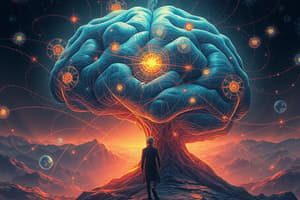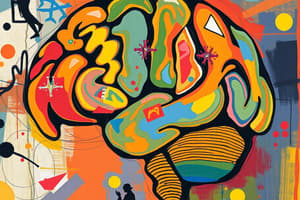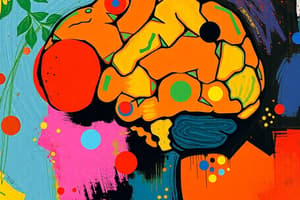Podcast
Questions and Answers
What major concept did F.C. Bartlett introduce related to memory?
What major concept did F.C. Bartlett introduce related to memory?
- Operant Conditioning
- Behavioral Conditioning
- Cognitive Dissonance
- Schemas (correct)
Which school of thought did Vygotsky belong to?
Which school of thought did Vygotsky belong to?
- Functionalism
- Structuralism
- Geneva School
- Soviet School (correct)
What does Vygotsky believe shapes consciousness?
What does Vygotsky believe shapes consciousness?
- Individual Experiences
- Social Behavior (correct)
- Introspection
- Biological Factors
According to Vygotsky, what role does language play in cognitive development?
According to Vygotsky, what role does language play in cognitive development?
What was a key focus of Vygotsky's research?
What was a key focus of Vygotsky's research?
Which approach did behaviorists like Watson and Skinner primarily reject?
Which approach did behaviorists like Watson and Skinner primarily reject?
What significant influence on consciousness did Vygotsky's studies demonstrate?
What significant influence on consciousness did Vygotsky's studies demonstrate?
What characterized European psychology in the first half of the 20th century?
What characterized European psychology in the first half of the 20th century?
What is the significance of social interaction in Vygotsky's theory of development?
What is the significance of social interaction in Vygotsky's theory of development?
Which concept is NOT part of Piaget's theory of cognitive development?
Which concept is NOT part of Piaget's theory of cognitive development?
How does Piaget perceive logical-rational thinking in relation to language?
How does Piaget perceive logical-rational thinking in relation to language?
What does George A. Miller's 'Magical Number Seven' theory relate to?
What does George A. Miller's 'Magical Number Seven' theory relate to?
What role do 'chunks' play in George A. Miller's work?
What role do 'chunks' play in George A. Miller's work?
What was Herbert Simon and Allen Newell known for in psychology?
What was Herbert Simon and Allen Newell known for in psychology?
Which theory did Donald Broadbent develop?
Which theory did Donald Broadbent develop?
In Piaget's theory, what does assimilation involve?
In Piaget's theory, what does assimilation involve?
What distinguishes weak AI from strong AI?
What distinguishes weak AI from strong AI?
Which of the following thinkers influenced Information Processing Theory?
Which of the following thinkers influenced Information Processing Theory?
In which year did Ulric Neisser publish 'Cognition and Reality'?
In which year did Ulric Neisser publish 'Cognition and Reality'?
What is a central tenet of cognitive psychology's approach to studying the mind?
What is a central tenet of cognitive psychology's approach to studying the mind?
What is one outcome of developments in Artificial Intelligence (AI)?
What is one outcome of developments in Artificial Intelligence (AI)?
Which of the following best describes the shift from AI to Information Processing Theory?
Which of the following best describes the shift from AI to Information Processing Theory?
What is the main criticism Noam Chomsky had against Skinner's theory of verbal behavior?
What is the main criticism Noam Chomsky had against Skinner's theory of verbal behavior?
Who is considered a pioneer in the modern development of psychobiology?
Who is considered a pioneer in the modern development of psychobiology?
What was a key criticism of the Information Processing Theory in the 1970s?
What was a key criticism of the Information Processing Theory in the 1970s?
What does behavioral genetics study?
What does behavioral genetics study?
Which concept is primarily associated with the work of Miller, Galanter, and Pribram regarding goal-directed behavior?
Which concept is primarily associated with the work of Miller, Galanter, and Pribram regarding goal-directed behavior?
Which statement best describes the relationship between psychobiology and behaviorism?
Which statement best describes the relationship between psychobiology and behaviorism?
What is ethology concerned with?
What is ethology concerned with?
What concept did Chomsky use to illustrate how people can recognize grammaticality?
What concept did Chomsky use to illustrate how people can recognize grammaticality?
Which two factors explain human behavior according to behavioral genetics?
Which two factors explain human behavior according to behavioral genetics?
What does the statement 'the brain acts as a unified whole' refer to in psychobiology?
What does the statement 'the brain acts as a unified whole' refer to in psychobiology?
Flashcards
Schemas of the Mind
Schemas of the Mind
The idea that remembering and thinking are not just passive recordings, but involve actively reconstructing information based on past experiences.
Schema
Schema
A concept introduced by F.C. Bartlett, referring to an active organization of past experiences that influences how we perceive and remember things.
Social Origin of Intelligence
Social Origin of Intelligence
Vygotsky's theory that intelligence, thought, and language originate from social interactions and cultural influences.
Social Behavior Shapes Consciousness
Social Behavior Shapes Consciousness
Signup and view all the flashcards
Higher Functions Emerge from Interaction
Higher Functions Emerge from Interaction
Signup and view all the flashcards
Learning Makes Development Possible
Learning Makes Development Possible
Signup and view all the flashcards
Language is Prior to Thought
Language is Prior to Thought
Signup and view all the flashcards
Sociocultural Theory
Sociocultural Theory
Signup and view all the flashcards
Zone of Proximal Development (ZPD)
Zone of Proximal Development (ZPD)
Signup and view all the flashcards
Assimilation (Piaget)
Assimilation (Piaget)
Signup and view all the flashcards
Accommodation (Piaget)
Accommodation (Piaget)
Signup and view all the flashcards
Social Origin of Intelligence (Vygotsky)
Social Origin of Intelligence (Vygotsky)
Signup and view all the flashcards
Higher Functions Emerge from Interaction (Vygotsky)
Higher Functions Emerge from Interaction (Vygotsky)
Signup and view all the flashcards
Chunking (Miller)
Chunking (Miller)
Signup and view all the flashcards
Filter System Theory (Broadbent)
Filter System Theory (Broadbent)
Signup and view all the flashcards
Thinking Machine (Simon and Newell)
Thinking Machine (Simon and Newell)
Signup and view all the flashcards
Cybernetics and Goal-Directed Behavior
Cybernetics and Goal-Directed Behavior
Signup and view all the flashcards
The Turing Test
The Turing Test
Signup and view all the flashcards
Weak AI
Weak AI
Signup and view all the flashcards
Strong AI
Strong AI
Signup and view all the flashcards
Information Processing Theory
Information Processing Theory
Signup and view all the flashcards
Cognitive Science and the Resurgence of the Mind-Body Problem
Cognitive Science and the Resurgence of the Mind-Body Problem
Signup and view all the flashcards
Ecological Psychology vs. IPT
Ecological Psychology vs. IPT
Signup and view all the flashcards
Psychobiology and Behavioral Genetics
Psychobiology and Behavioral Genetics
Signup and view all the flashcards
Methodological Behaviorism
Methodological Behaviorism
Signup and view all the flashcards
Computational Simulation
Computational Simulation
Signup and view all the flashcards
Innate Universal Grammar
Innate Universal Grammar
Signup and view all the flashcards
Psychobiology
Psychobiology
Signup and view all the flashcards
Behavioral Genetics
Behavioral Genetics
Signup and view all the flashcards
Ethology
Ethology
Signup and view all the flashcards
Sociobiology
Sociobiology
Signup and view all the flashcards
Biopsychosocial Approach
Biopsychosocial Approach
Signup and view all the flashcards
Study Notes
Unit 10: Cognitive Psychology - History of Psychology
- Cognitive psychology currently dominates academic psychology.
- Interest in cognition increased, with figures like Wundt, Ebbinghaus, Structuralism, Functionalism, and Gestalt all contributing.
- Watson and Skinner's behaviourism rejected cognition as a subject of study.
- Behaviourism predominated in the USA, while mentalistic research developed in Europe.
- Early 20th-century European psychology was fragmented, with key schools emerging, such as the Soviet School and the Geneva School.
Index/Contents
- Introduction
- F. C. Bartlett
- Soviet School: Vygotsky (1896-1934)
- Geneva School: Jean Piaget (1896-1980)
- Early developments in Cognitive Psychology
- Artificial Intelligence
- Information Processing Theory
- Methods of Cognitive Psychology
Cognitive Psychology Concepts
- Perception
- Attention
- Human Intelligence
- Language
- Thinking & problem solving
- Memory
1. Introduction
- Cognitive Psychology dominates academic psychology.
- Early interest in cognition (Wundt, Ebbinghaus, etc) and subsequent rejection of cognition as an object of study (Skinner and Watson).
- Behaviourism predominated in the US, while developed mentalistic research emerged in Europe.
- Dispersed and unconnected schools of thought emerged in Europe during the first half of the 20th century.
2. F. C. Bartlett (1886-1969)
- His theory was "Schemas of the Mind."
- He stated that remembering and thinking are reconstructive processes.
- His research focused on real-life situations and memory.
- Published "The Remembrance..." (1932)
- He introduced the concept of schema as an active organisation of past experiences.
3. Soviet School: Vygotsky (1896-1934)
- He formulated the theory of the social origin of intelligence, thought, and language.
- He accepted the study of consciousness but rejected introspection.
- Consciousness does not determine behaviour—social behaviour shapes consciousness.
- Conducted cross-cultural studies to demonstrate the social influence on consciousness.
- His main contribution was about "child development," where he highlighted that higher functions (thinking, language) emerge from interaction with adults and more competent peers.
- Learning makes development possible.
- Language precedes thought in evolutionary terms.
4. Geneve School: Jean Piaget (1896-1980)
- His largest disciplinary project was "The General Theory of Knowledge."
- Cognitive development, according to Piaget, is not dependent on language but is closely related to action.
- Development is an adaptive process where the child modifies their behaviour to better understand the world.
- Assimilation: fitting new information into existing frameworks (schemas).
- Accommodation: adapting existing frameworks to incorporate new information.
4. Geneve School: Jean Piaget (cont.)
- Theory of Cognitive Development
4. Geneve School: Jean Piaget (cont.)
- Stages of Cognitive Development:
- Sensorimotor (birth - 2 years)
- Preoperational (2 - 7 years)
- Concrete operational (7 - 11 years)
- Formal operational (11+)
Piaget & Vygotsky Comparison
- Psychological constructivism (Piaget): learning is individual
- Social constructivism (Vygotsky): learning occurs through participation with others.
- Zone of Proximal Development.
- Scaffolding
- Active learning, exploration, and discovery.
5. Early Development in Cognitive Psychology
- George A. Miller (1920): first psychologist to recognize the importance of information theory in psychology.
- Studied memory and published "The Magical Number Seven, Plus or Minus Two: Some Limits on Our Capacity for Processing Information."
- Proposed the concept of "chunks" for organizing information.
6. Artificial Intelligence (AI)
- Influenced the development of information processing theory.
- Created by Alan Turing in 1950.
- "Computing Machinery and Intelligence" article.
- Turing test to assess machine intelligence.
- Positions on the Turing test (Weak AI, Strong AI).
7. Information Processing Theory
- Developed from AI
- The passage from AI to IPT is marked by Newell, Shaw, and Simon's 1958 article.
- Human information processing is similar to computer processing (input, processing, output).
- It's a combination of rationalism theory, and methodology behaviourism.
7. Information Processing Theory (cont.)
- Resurgence of the mind-body problem.
- Cognitive science emerged in the 1970s.
- Ulric Neisser's book "Cognition and Reality" (1976).
- Proposed replacing information processing theory with ecological psychology.
- Interest in artificial intelligence, particularly in how the brain functions. Psychobiology, Behavioural genetics emerged as part of cognitive study.
8. Methods of Cognitive Psychology
- Cognitive psychology re-examines the mind as an area of study, incorporating methodological behaviourism.
- Introspection is rejected as a method in cognitive psychology.
- Execution times in experiments
- Computational simulations (models).
9. The Influence of Noam Chomsky
- Criticisms of Skinner's book on verbal behavior.
- Language is complex and cannot be learned through the mechanisms Skinner proposed.
- Chomsky argued for universal grammar that explains language structure, which is different for each language.
10. Development in Psychobiology and Behavioral Genetics
- Psychobiology seeks to explain mental events from biological foundations.
- Figures like Hippocrates and Aristotle.
- Research from Karl Lashley (1890-1958) in psychobiology examined behaviourism.
- Psychobiology expanded as behaviourism lost its influence.
- Donald Hebb and Roger Sperry were authors who further researched the subject.
10. Development in Psychobiology and Behavioral Genetics (cont.)
- Behavioural genetics, a branch of psychobiology, examines genetic influences on cognition and behaviour.
- Related topics are:
- Ethology
- Sociobiology- genetic predisposition and cultural creation
References
- Hergenhahn, B. R. (2009). An Introduction to the History of Psychology. Belmont: Wadsworth.
Studying That Suits You
Use AI to generate personalized quizzes and flashcards to suit your learning preferences.




